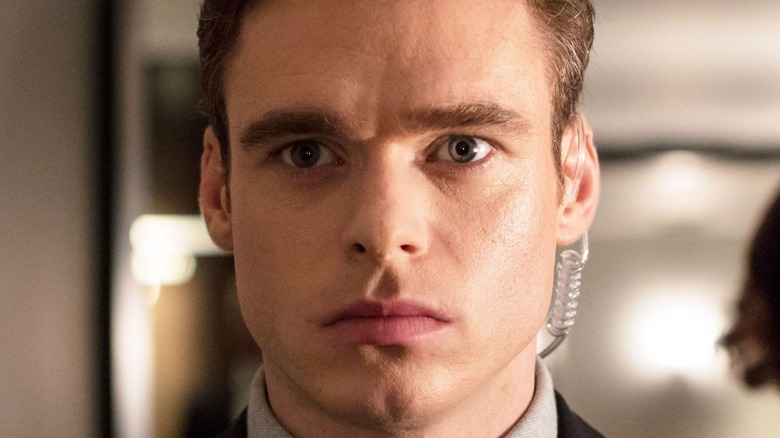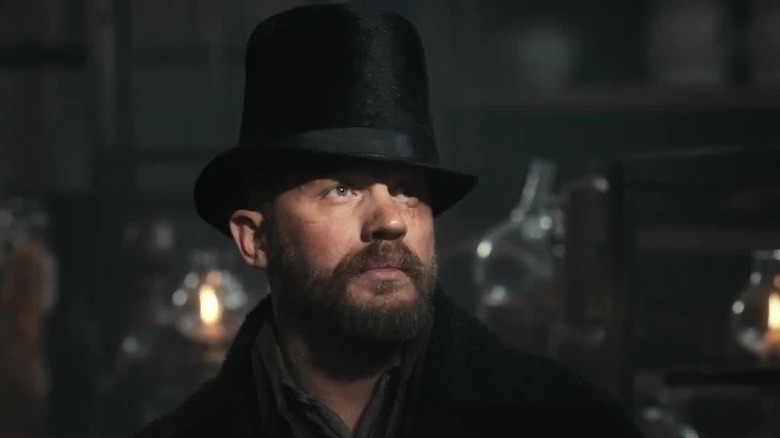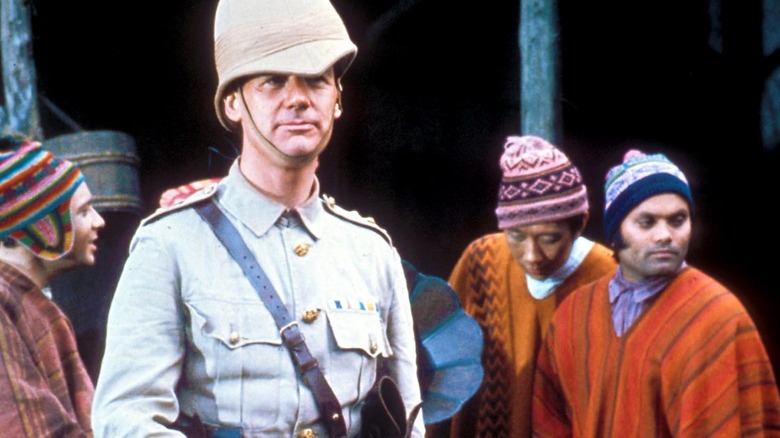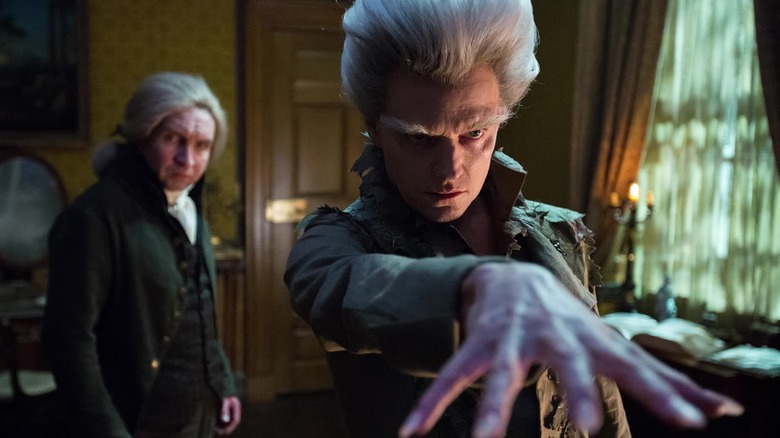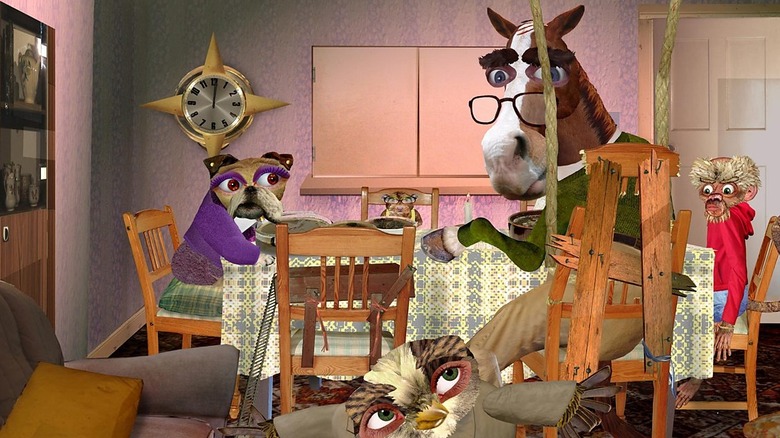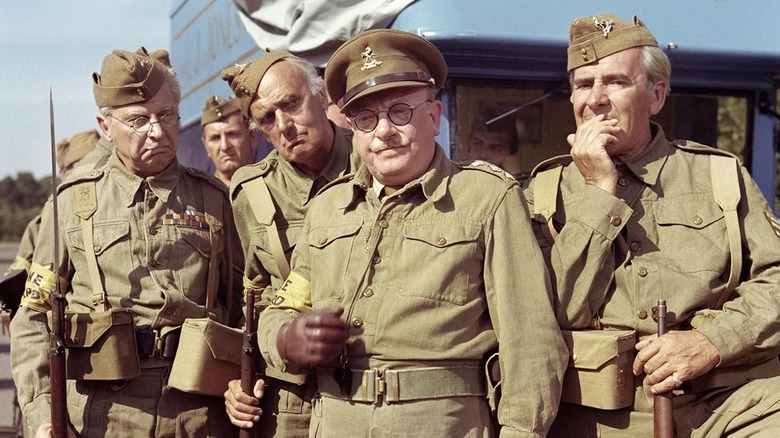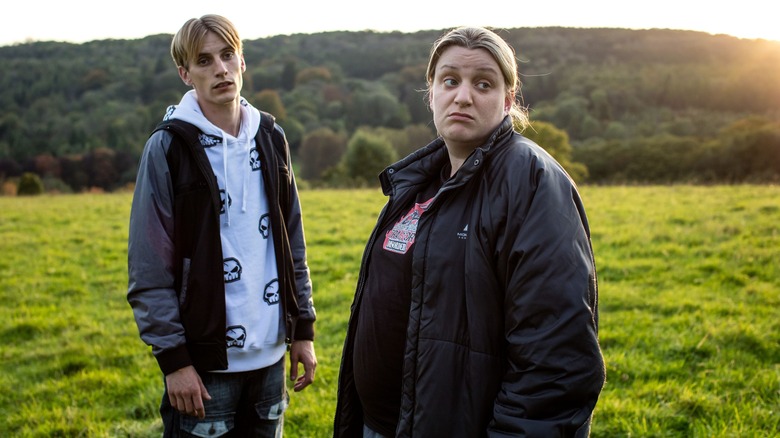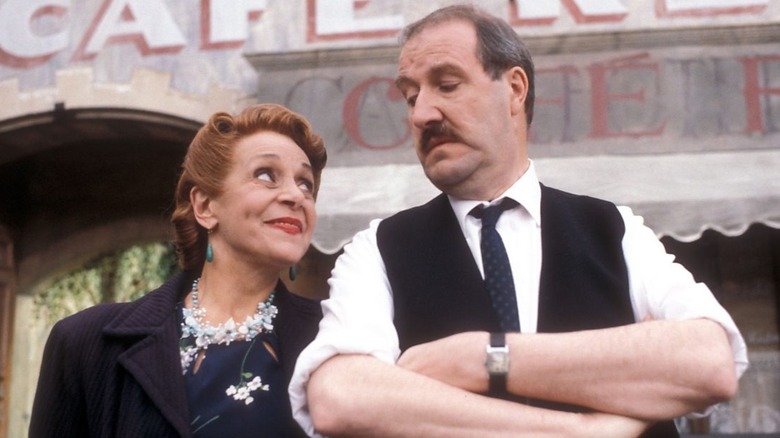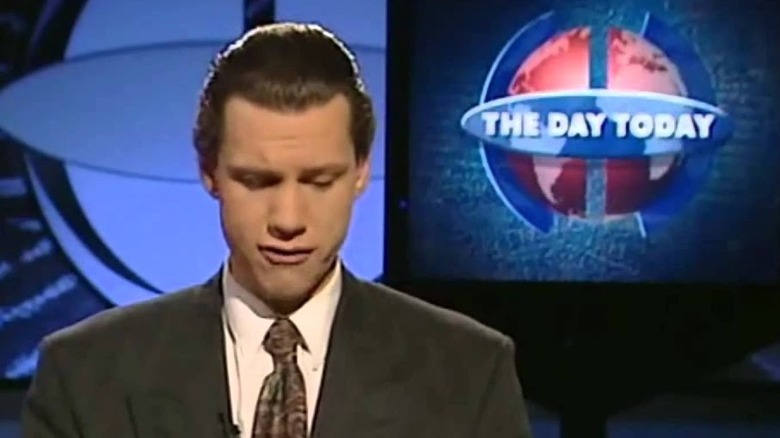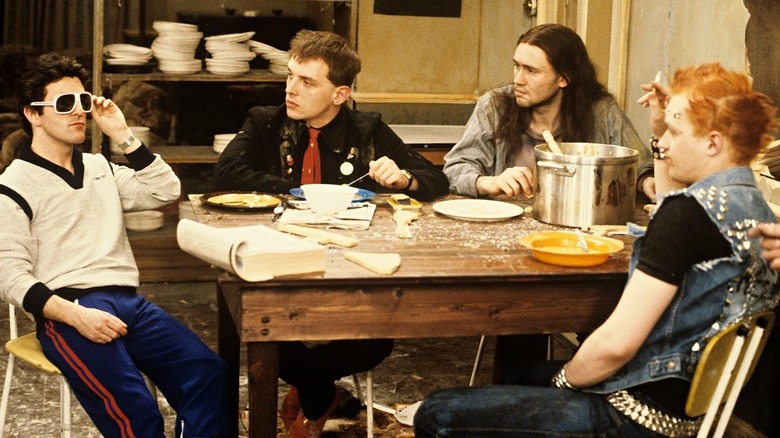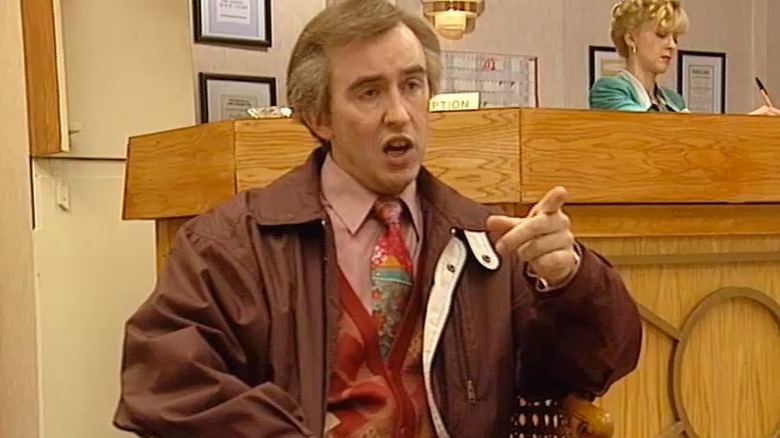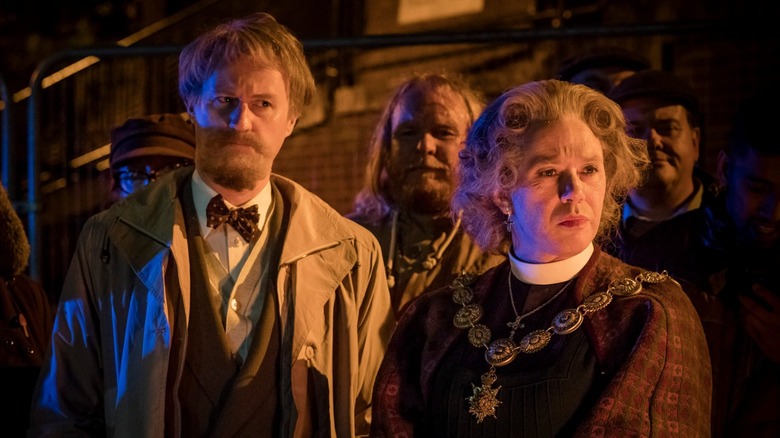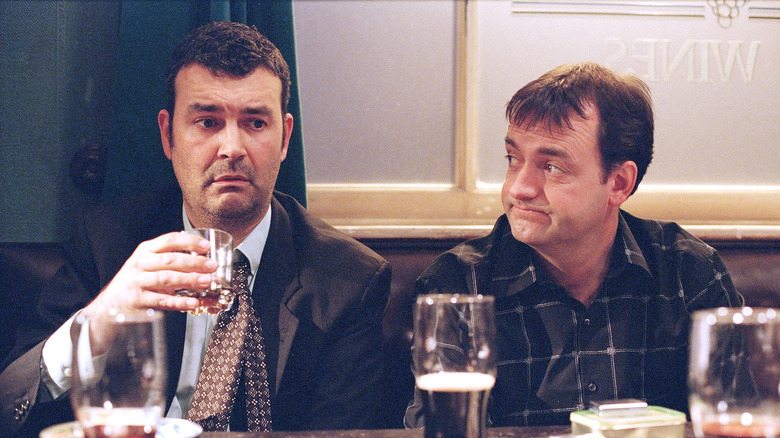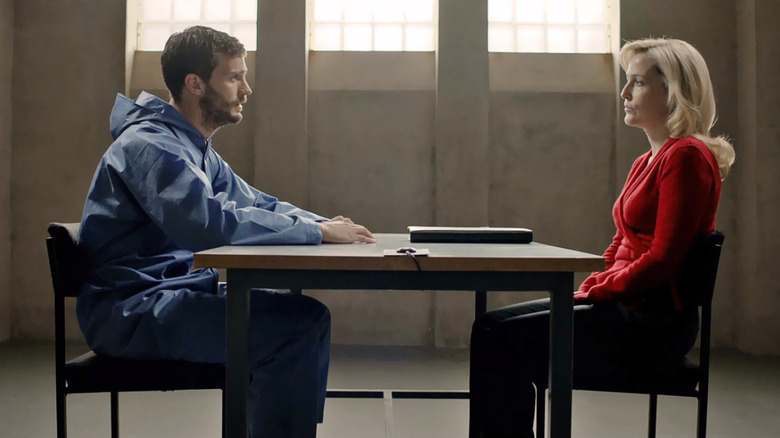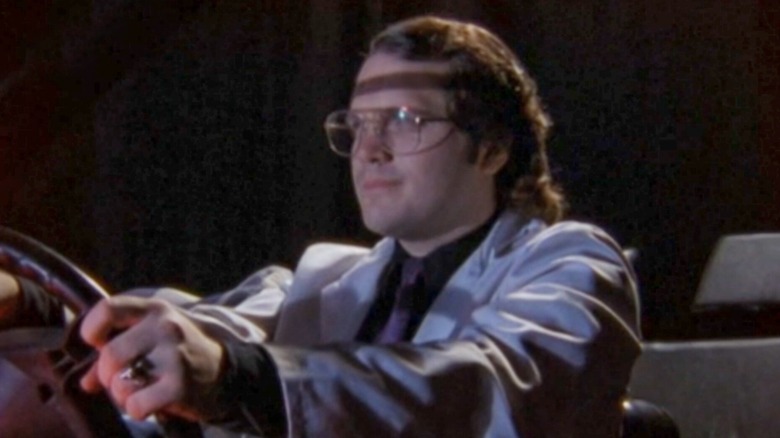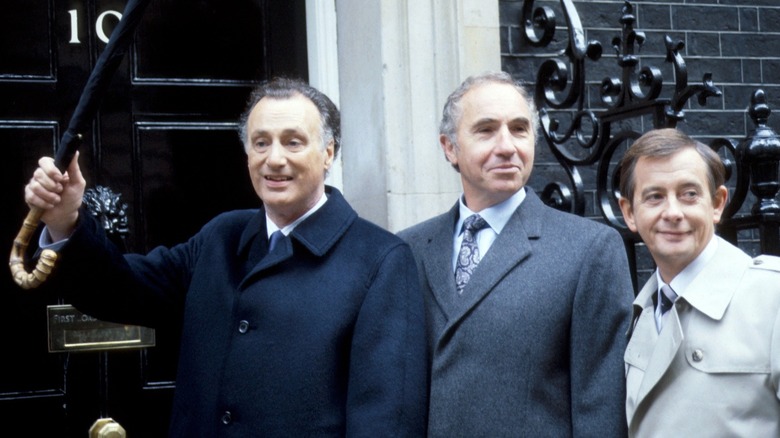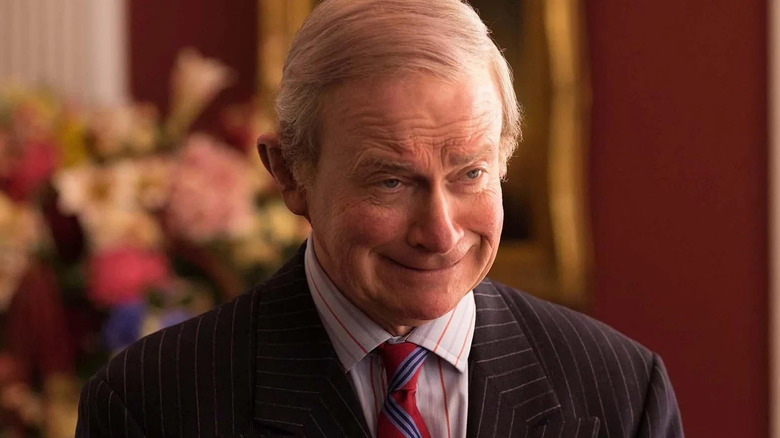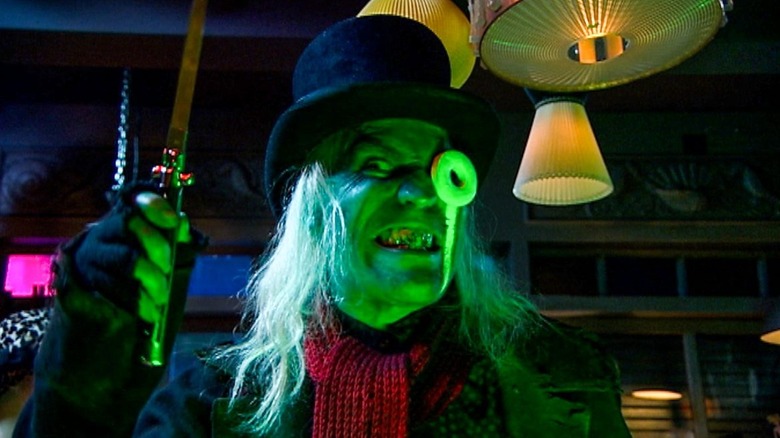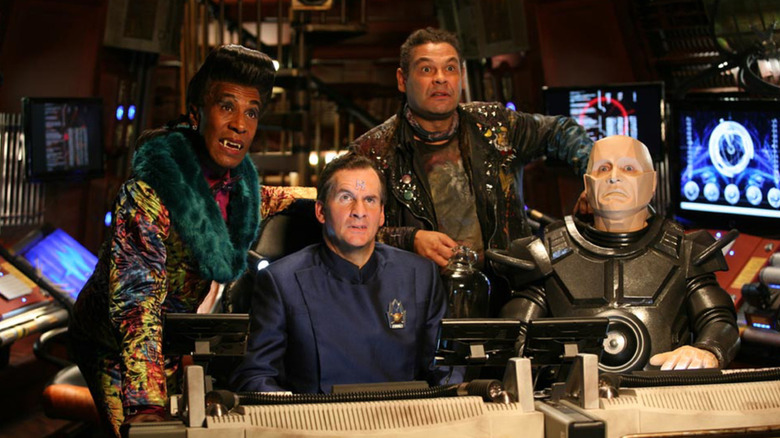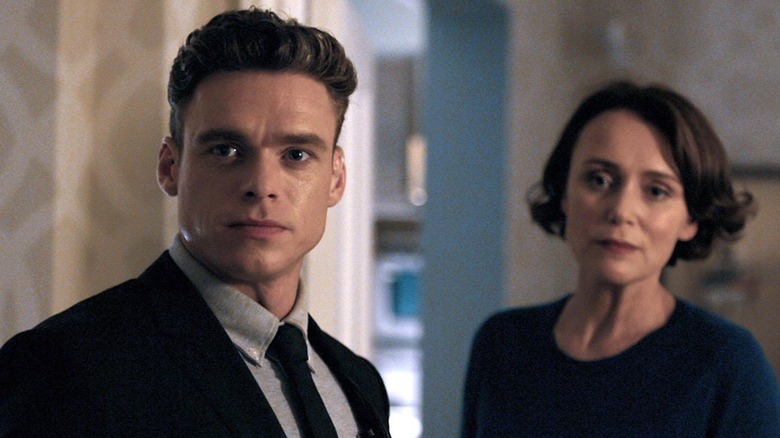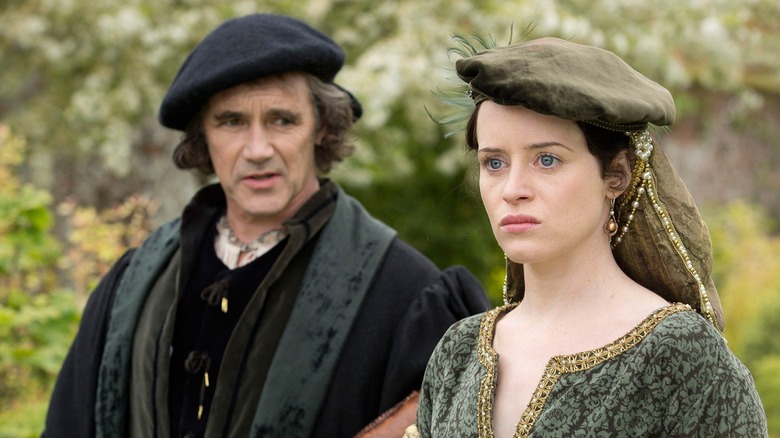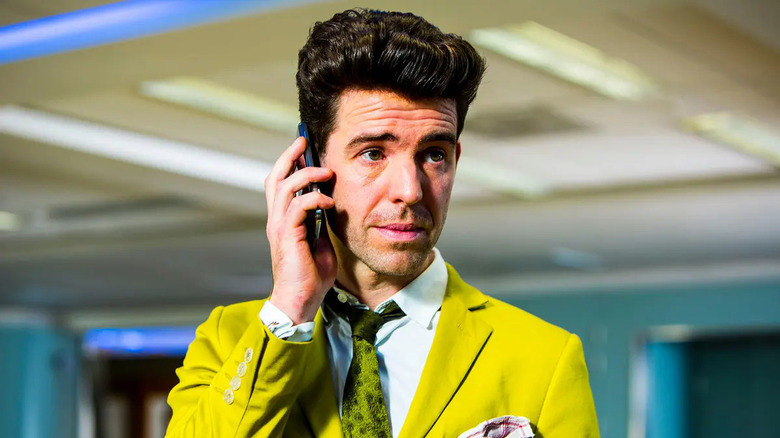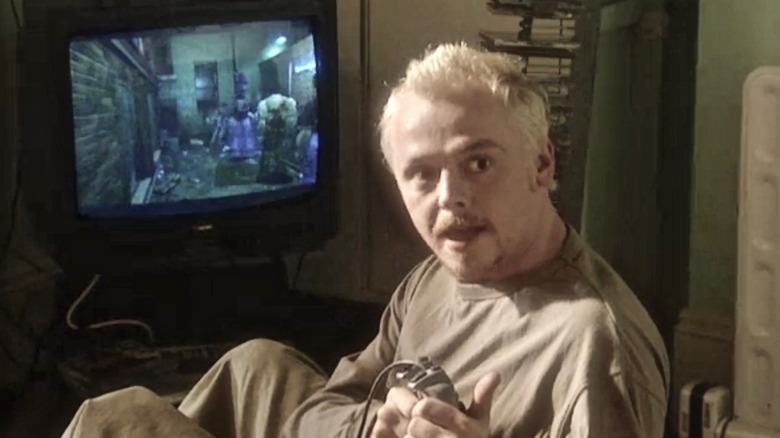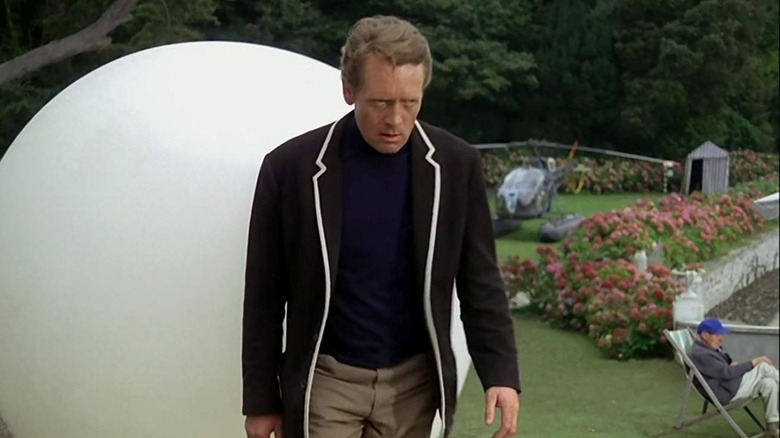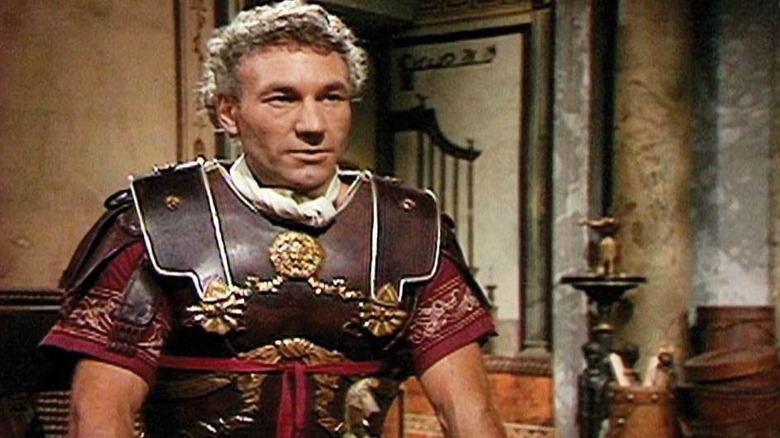Underrated British TV Shows You Need To Watch
On the surface, one might immediately think that British television is very similar to any American TV program you can find on cable or currently streaming. However, as anyone who's seen a decent amount of British and American series can tell you, the two couldn't be further apart.
Known for their strong surrealistic elements, dry wit, and dramatically small number of episodes compared to American TV series, British TV shows are practically a genre unto themselves. Whether they encompass historical dramas, absurdist comedies, or sitcoms set in World War II, you know without question when you're tuning into a TV show from across the pond, judging from its sense of humor and content alone.
Like any nationality, the United Kingdom has a ton of British TV shows that are well worth watching in their own right, many of which have gone on to draw in a massive cult following of fans (such as "Doctor Who" or "Sherlock"). For as many well-known British shows there are out there, though, there are also dozens of series that frequently fly under audiences' radar today, but are still definitely worth seeing. Here is a selection of the best, most under-appreciated TV series to ever come out of the U.K. ranked from worst to best.
25. Taboo
If you regularly tune into FX, you might remember this strange historical drama series that starred Tom Hardy. After over a decade spent exploring Africa, James Delaney (Hardy) returns home to London upon hearing news of his father's death. Using his inheritance to establish a trading company in direct competition to the shadowy East India Company, Delaney does his best to protect himself from the corrupt officials who want to claim his family's property for themselves.
Created by Hardy, Hardy's father, and Hardy's frequent collaborator, Steven Knight (the creator of "Peaky Blinders"), "Taboo" was a labor of love that ultimately paid off, presenting the less glamorous side of London in the early 1800s with the same level of authenticity and griminess as "Deadwood's" representation of the Old West. Though fans have eagerly been anticipating a second season of "Taboo" ever since 2017, the first season still offers a one-of-a-kind portrayal of 19th-century London's seedy underbelly.
Despite some criticism over its slightly slow start, most critics gave the series a positive appraisal, with particular praise being aimed at Hardy's performance and the show's atmosphere. "'Taboo's" strength is that, despite borrowing from westerns, gangster flicks, and even Dickens, it still manages to feel utterly original," wrote The Telegraph's Ben Lawrence. It's been nominated for several major awards, including the Primetime Emmy Award for outstanding music composition for a series and a Satellite Award for best drama series.
24. Ripping Yarns
Co-created by Michael Palin and Terry Jones, two of the founding members of Monty Python, "Ripping Yarns" is a show that can only be accurately described as "Pythonesque." Each episode takes on a new genre, mocking different facets of "proper" English culture, from the parlor mysteries of Agatha Christie to World War I spy stories.
To be clear, "Ripping Yarns" is not nearly surreal as Palin's most famous work on Monty Python, but the show does possess a very loose, satirical tone that can be found in many sketches of "Flying Circus." Thanks to its unique anthology-like approach, each episode feels more like its own self-contained short movie than it does a single part of a whole TV series, bringing in a ton of different guest actors with each new episode. Jones and former Monty Python member John Cleese even pop up in supporting roles during the series' run.
While not as famous as other post-Python projects like "Fawlty Towers," critics have continuously maintained a generous outlook on "Ripping Yarns." The series was nominated for a BAFTA for best film cameraman, later winning for best light entertainment programme/series. "There's no savagery in the humour; instead, it's charming, insightful, and very, very silly," said The Guardian's Phelim O'Neill.
23. Jonathan Strange & Mr. Norrell
Based on Susanna Clarke's Hugo Award-winning debut novel of the same name, "Jonathan Strange & Mr. Norrell" imagines an alternative version of England during the height of the Napoleonic Wars — a world where magic exists, but has heavily fallen out of practice. The series follows two men, the reclusive magician Mr. Norrell (Eddie Marsan), who is attempting to use his craft to help Britain in their fight against France, and Jonathan Strange (Bertie Carvel), a young novice who is prophesied to one day become a powerful sorcerer.
Encompassing only one season made up of seven episodes, "Jonathan Strange & Mr. Norrell" retains much of the spirit and tone of Clarke's original novel, staying faithful to its source material while making just enough changes to help introduce it to television audiences. The result is a wondrous modern drama that mixes fantasy with history, melding the two together seamlessly and as imaginatively as possible.
Upon its release in 2015, "Jonathan Strange & Mr. Norrell" won rave reviews from critics, with The Observer's Evan Ferguson likening it to "Harry Potter for adults." It received a number of award nominations, including the Saturn Award for best fantasy television series and four BAFTA nominations, and was named one of the best shows of 2015 by the British Film Institute. "I don't think it's hyperbolic to say that 'Jonathan Strange & Mr. Norrell' is the finest new drama that's been on our screens this decade. In fact, if the first two episodes are anything to go by, it could go down as one of the best this century," said Den of Geek's Nick Horton.
22. I Am Not an Animal
One of the strangest, most off-beat shows possibly to ever come out of the U.K. "I Am Not an Animal" is a darkly comic animated series that is literally unlike any other. At the heart of the series is a group of anthropomorphic animals who have been physically and mentally altered by lab scientists to take on human qualities and characteristics. After animal rights activists break them out of their confinement, the animals struggle to adapt to their newfound human-dominated settings, the world not being exactly used to the idea of talking animals living among them.
A grim commentary on animal experimentation and the struggle to blend in with other "normal" people, "I Am Not an Animal" is as high concept a British show gets, but rarely if ever boring. Some viewers might find the subject matter a bit too upsetting or the humor too off-putting, but it's a series that's well worth watching for any fans of other equally adult animated series like "South Park" or "Rick and Morty."
Many critics have spoken positively about the series' humor and originality, with many American reviewers citing it as a show that could comfortably fit in with any number of adult series you can find on Adult Swim. "'I Am Not an Animal' is a deep, dark and funny six-part animated series that recalls variously 'The Island of Dr. Moreau,' 'Animal Farm,' the Robert Downey Sr. film 'Pound,' and 'Homeward Bound: The Incredible Journey,' that Disney movie about the dog and the cat and the other dog making their way out in the wild," said the Los Angeles Times' Robert Lloyd.
21. Dad's Army
A classic British sitcom that ran from 1968 to 1977 (a surprisingly long time for a British series), "Dad's Army" is one of the most successful U.K. shows ever made. Comprising nine seasons and 80 episodes, it served as the basis for a 1971 feature film adaptation, a stage play, and a radio series that lasted for three seasons. Though not widely known to worldwide audiences today, it drew consistently high ratings and viewership numbers during its original run, averaging 18 million audience members during its peak (per BBC News).
Set in the fictional town of Walmington-on-Sea on the southern English coast, the series focuses on the local Home Guard that is assigned to protect the town from German invasion during World War II. Predominantly judged unfit for military service (meaning that most of the platoon are older men), the Home Guard act as the last line of defense should the Germans cross the English Channel.
One of Britain's premier television shows of the 1970s, "Dad's Army" has become something of a phenomenon within British pop culture, with many of the show's trademark phrases becoming well-known and oft-quoted within the country. In 2004, "Dad's Army" placed fourth on a BBC poll to find the best British sitcom. In 2000, the British Film Institute ranked it No. 13 on their list for the 100 Greatest British Television Programmes.
20. The Royle Family
Another popular British sitcom "The Royle Family" ran from 1998 to 2012, over the course of three seasons. The series focuses on the Royles, a working-class family who spend most of their time watching television. Much of the show takes place within the family's living room, heavily revolving around the conversations they have in regards to TV shows they're currently watching and the personal situations they're involved in outside of the house.
The general concept may sound dull, but "The Royle Family" manages to do so much with very little, relying extensively on the dry wit of the writing and performances. Divided into three seasons and totaling 25 episodes (in addition to five Christmas specials), it's commonly seen as being one of the best British series of its day, earning several BAFTA awards for best situation comedy and nominations for best comedy (programme or series), among many other nominations.
At the time of its airing and in subsequent years, it's continued to rank favorably as one of the greatest British sitcoms ever made, earning a spot on the British Film Institute's list of the 100 Greatest British Television Programmes. The series also placed highly on the BBC's poll for Britain's Best Sitcom, illustrating just how well-loved it was at the time it was released in the early 2000s.
19. This Country
Imagine the original British version of "The Office" centered around a wider community than a simple office workplace. That pretty much sums up "This Country." A mockumentary that follows two cousins (series co-creators and real-life siblings Daisy May and Charlie Cooper) in a small, quiet village in central Britain, the series primarily focuses on the minute interactions they share with local town residents, as well as the (at times) intense feelings of boredom they feel in their mundane lives.
Though the show heavily deals in British culture (given its geographic settings in the English countryside), viewers of all ages and nationalities can likely relate to "This Country." The show's portrayal of life in a small-town community, teenage angst and restlessness, and the sometimes awkward exchanges that arise between people of differing generational gaps have all won praise from critics, along with the series' infectiously funny humor.
"It isn't very often that I am able to recommend something because it made [me] weep tears of laughter, but I am happy and heartened to say that the latest BBC mockumentary, 'This Country,' is sublime enough to have lifted my spirits heavenwards," said The Independent's Sean O'Grady. During its three-season-long run, "This Country" won several BAFTA awards, winning for best scripted comedy, best female comedy Performance (Daisy May Cooper), and best male comedy performance (Charlie Cooper).
18. 'Allo 'Allo!
One of the most humorously chaotic sitcoms on either side of the Atlantic, "'Allo 'Allo!" was one of the best TV series on British television during the 1980s, serving as a parody of the far more straight-laced British drama series, "Secret Army." Set amidst Germany's invasion of France during World War II, the show focuses on a French cafe owner who routinely has to deal with corrupt German officers, local French resistance fighters, and a pair of displaced British pilots, all the while trying to hide the several affairs he's having with his waitresses.
A timeless cross between the comedic World War II setting of "Dad's Army" and the farcical humor of "Fawlty Towers," "'Allo 'Allo" is an unexpectedly fresh comedy that makes endlessly entertaining use of its cliched characters and the comedic situations that arises between them. The result proved incredibly popular among viewers, earning high ratings throughout its nine-season-long run from 1982 to 1992. The success of the show even led to a lengthy touring stage show adaptation that ran from 1986 to 1992, and that has occasionally been revived in later years.
During its nine seasons, "'Allo 'Allo!" earned several nominations from major award ceremonies, having been nominated for best comedy series at the BAFTAs from 1986 to 1989. "”Allo 'Allo!' manages a pretty impressive feat, flying in the face of what we have come to believe a comedy must be, and yet it works in spite of it. The material is hackneyed, the jokes are often seen coming from miles away, but it never lacks for moments of inspired hilarity. Life during wartime has never been funnier," said The AV Club's Benjamin Cannon.
17. The Day Today
A spoof of British news broadcasts, "The Day Today" finds a cast of air-headed, completely inept news broadcasters discussing a variety of fictitious news stories, ranging from current events in world politics to providing lubriciously poor analyses of recent sporting events. As biting a satirical TV show as one can find, "The Day Today" pokes fun at pretty much every topic under the sun, openly mocking the overly-serious presentation of breaking news stories making headlines today.
Comprising only six episodes, "The Day Today" was a major critical success when it aired in 1994, kickstarting the careers of several cast and crew members like Steve Coogan, Chris Morris, and series co-creator, Armando Iannucci. The success of "The Day Today" even resulted in another, supremely successful spin-off series centered around Coogan's self-important sports reporter, Alan Partridge, a character who subsequently appeared in several shows, specials, and movies.
"'The Day Today' is a sublime sketch show. The recurring characters ... are beautifully realised. The comic density is extraordinary. The details of the various setups, musical parodies, and recurring skits are minutely and perfectly observed," said The Guardian's Phil Harrison. The show won the BAFTA Award for best graphic design and the British Comedy Award for best TV comedy newcomer (Morris).
16. The Young Ones
The epitome of 1980s counterculture TV, "The Young Ones" follows the lives of four vastly different young men (a stereotypical hippie, punk rocker, anarchist, and yuppie businessman) who live as roommates at a decrepit flat as they attend the nearby Scumbag College in London. Most episodes feature the main cast getting into all kinds of absurdist, chaotic situations, often involving the destruction of their flat, and conflicts with their landlord's family.
"The Young Ones" remains one of the more unique shows in the BBC's history. Featuring a heavy use of slapstick, visual gags, and surrealism, episodes of "The Young Ones" frequently feel more like a memorable sensory hodgepodge than a traditional TV series. The show features a number of famous guest stars like Stephen Fry, Hugh Laurie, Terry Jones, Robbie Coltrane, and Emma Thompson, and interspersed throughout are randomly thrown-in musical performances by established metal bands like Motörhead and The Damned.
In later years, "The Young Ones" has become something of a cult hit among modern audiences, even inspiring a 1986 video game and later serving as the basis for an unsuccessful, unaired American adaptation of the series titled "Oh No! Not THEM!" The popularity of the show would lead to it winning the BAFTA Award for best comedy series, as well as appearing as No. 31 on the BBC's poll for Britain's Best Sitcom. "Like Monty Python and The Goons, some of it seems dated now. And not all of it (particularly the scabrous puppet interludes) worked. But at its frequent best it had a raw, punkish energy that caught the zeitgeist," said the i's Jeff Robson.
15. I'm Alan Partridge
A spin-off of "The Day Today," "I'm Alan Partridge" stars Steve Coogan as a clueless radio DJ who's recently been left by his wife and let go from the BBC. At home in the countryside with nothing to do, Partridge spends his days optimistically waiting for a call that will get him back on television and (hopefully) get his life back on track.
"I'm Alan Partridge" lacks the same out-and-out satirical nature of "The Day Today," instead presenting itself more in a classical sitcom format. However, the show still does a tremendous job presenting the often socially awkward escapes of its star, showcasing many of Partridge's fruitless attempts to get himself back in the spotlight.
Critically acclaimed during its 1997 to 2002 run (it ran for two seasons and a total of 12 episodes), "I'm Alan Partridge" proved incredibly popular among viewers and critics at the time. It would win two out of the three BAFTAs it was nominated for (winning for best comedy performance [Coogan] and best comedy (programme or series]), as well as earning British Comedy Awards for best TV sitcom and best TV comedy Actor (Coogan). The show was also featured in the British Film Institute's list of the 100 Greatest British Television Programmes, and appeared on The Telegraph's list of the 10 best TV sitcoms of all time.
14. The League of Gentlemen
A surreal mix of dark comedy and horror, "The League of Gentlemen" follows the numerous eccentric locals of Royston Vasey, a fictional town in northern England with its own complex history and colorful inhabitants, many of which are played by the series' creators; Mark Gatiss, Steve Pemberton, and Reece Shearsmith. A loose, rambling narrative that focuses on the bizarre antics of Royston Vasey's occupants, "The League of Gentlemen" doesn't have the same cohesive premise as other sitcoms. Rather than this being a downfall on the show's part, though, such looseness allows for a variety of unforgettably anarchic storylines and episodes.
It's not always easy to find a balance between laugh-worthy comedy and chill-inducing horror, but "The League of Gentlemen" deftly locates that balance, presenting characters and situations that are both humorous and more often than not disturbing in nature. It's thanks to this blend of genres that the show proved instantly popular among viewers, leading to a successful film continuation ("The League of Gentlemen's Apocalypse") and a live stage production ("The League of Gentlemen Are Behind You!"), both released in 2005.
Composed of three seasons, 22 episodes, three anniversary specials, and one Christmas special, "The League of Gentlemen" has been nominated for several awards, winning the BAFTA for best comedy (programme or series) and earning the British Comedy Award nominations for best TV comedy. "'The League of Gentlemen,' which first appeared on the BBC in 1999, is an amalgam of sketches, sight gags, running jokes and plot lines that almost defies description. Attempting it is like trying to convey to someone living in two dimensions what three-dimensional existence feels like," said The New York Times' Neil Genzlinger.
13. Early Doors
A sitcom that's very much along the same lines as "The Royle Family," with a shared co-creator in the form of Craig Cash, "Early Doors" is set within a small pub in Stockport, revolving around numerous mundane storylines involving the bar's patrons and staff members. Taking center stage in the show is Ken, the pub's owner, whose wife has recently left him for his best friend, and who now lives with his mother and stepdaughter.
The British equivalent of "Cheers," "Early Doors" presents the seemingly average lives of Stockport's residents with a characteristically dry wit to it. However, like "The Royle Family," this series is anything but boring, opting for realistic storylines and characters audiences can relate to, rather than the wackier hijinks of other sitcoms on television.
While "Early Doors" underperformed in terms of audience viewership during its two-season run from 2003 to 2004, the show has continued to do well in terms of critical reappraisals since it went off air, even resulting in an award-winning stage show production, "Early Doors Live." The superior quality of the series also ended up guaranteeing it a spot on the BBC poll for Britain's Best Sitcom.
12. The Fall
A police procedural drama series, "The Fall" stars Gillian Anderson as a cold, emotionally walled-off detective superintendent investigating a series of brutal murders in Northern Ireland. Her investigation eventually leads her to a seemingly normal bereavement counselor (Jamie Dornan), who moonlights as a vicious serial killer known as the "Belfast Strangler." As the detective and killer enter an intense game of cat and mouse, the detective struggles to find enough evidence to build a case against him, all the while dealing with bureaucratic red tape that greatly hinders her efforts.
A wonderfully-paced, sublimely-acted crime series, "The Fall" is an ideal viewing option for fans of anything TV show or movie that features Hannibal Lector. Spanning three seasons and 17 episodes, it's a taut, claustrophobic show where anything can happen at any moment, each episode brilliantly building up to an exciting conclusion that pits the climactic clash between the detective and her No.1 suspect.
Despite a shaky reception to the show's third and final season, "The Fall" still earned generally positive reviews, leading it to earn a BAFTA nomination for best leading actor (Dornan), a National Television Award nomination for best drama, and a Satellite Award nomination for best television series – drama, among many other awards and nominations. "'The Fall' is still remarkably gripping television. Even more important, it's one of the few police procedurals that takes its violent, terrifying, misogynistic antagonist with deadly seriousness," said Vulture's Kathryn VanArendonk.
11. Garth Marenghi's Darkplace
One of the most ingeniously and remarkably well-done horror parodies ever made, "Garth Marenghi's Darkplace" is a wonderfully complex but effortlessly fun show within a show. On the surface, it stars series co-creator Matthew Holness as his famous fictional character, Garth Marenghi, a self-absorbed "author, dreamweaver, visionary, plus actor" active during the 1980s. With the advice of his publisher (co-creator Richard Ayoade), Marenghi creates his own series, "Garth Marenghi's Darkplace," a low-budget, poorly-acted, hopelessly dated horror series set in a London hospital located "over the very gates of Hell."
Framed in a mockumentary style format, the show features Marenghi and his fellow, equally narcissistic cast members of the show as they watch and discuss old episodes of the series. Bursting with imagination and poking fun at dozens of outdated conventions of 1980s horror and TV drama series, "Garth Marenghi's Darkplace" ran for only one season in 2004. While the series only grossed a marginal number of viewers, it would become a phenomenon among horror and comedy fans as news of the show circulated on the internet.
The success of the series helped launch the careers of Holness, Ayoade, and co-stars Matt Berry and Alice Lowe, all of whom would go on to enjoy successful careers in the years to come. Nowadays, "Garth Marenghi's Darkplace" is considered a cult classic TV series, having gathered a loyal fan following. "Though it might seem otherwise, it takes tremendous skill to be bad on purpose, at least in a way that doesn't seem merely amateurish. From its misplaced edits to flat performances and overripe dialogue, 'Darkplace' is perfect in its imperfections," said IndieWire's Sam Adams.
10. Yes Minister
One of the few British sitcoms to receive a sequel series, we highly recommend checking out "Yes Minister" and its closely-related follow-up series, "Yes, Prime Minister," if you can. Both series are equally hilarious takes on British politics. In "Yes Minister," viewers watch the newly elected minister, Jim Hacker, of the fictional Department of Administrative Affairs as he deals with the daily struggle of running a minor office. In "Yes, Prime Minister," we follow that same character as he unexpectedly rises to the highest seat of power in British government, yet faces many of the same issues that plagued him in his previous position.
Both series are intelligent, engrossing shows that portray the trivialities of politics in less powerful departments as well as those that take place at the top of the government. It also shows just how often personal or political feuds can interfere with government affairs, miring key issues in what is usually a petty rivalry between two government workers (such as Hacker and his nemesis/Permanent Secretary, Sir Humphrey Appleby).
Both "Yes Minister" and "Yes, Prime Minister" received critical acclaim in their respective runs throughout the 1980s. Critics praised the show's representation of government, while also complimenting the series for its writing, which they felt challenged viewers in a more academic, unpretentious way. "You can't fall asleep during an episode of 'Yes Minister.' The show knew how to do farce, slapstick, and physical comedy when the occasion called for it," said Den of Geek's Juliette Harrisson. "Yes Minister" won the BAFTA for best comedy series three years in a row, while "Yes, Prime Minister" was nominated for best comedy series for two consecutive years. Margaret Thatcher, at that point Prime Minister of the United Kingdom, even named it her favorite TV show during her tenure in government.
9. The Windsors
"The Windsors" imagines the personal lives of the Windsor royal family as a chaotic soap opera, casting each member of the monarchy as a caricatured version of themselves. Though completely fictitious, many of the show's storylines are loosely based on actual incidents that have occurred within the Windsor family, though the series adds a much more outlandish spin on these occurrences.
Running for three seasons and 20 episodes, "The Windsors" offers a satirical take on the British monarchy that's almost as biting and critical as "South Park." It's crude, rude, and almost always funny whether you're familiar with the royal family or not (although it certainly helps and makes it funnier if you do). For its overly melodramatic storylines and parodic comedic style, the show won positive marks from critics, and earned a BAFTA nomination for best male performance in a comedy programme (Harry Enfield for his starring role as the buffoonish Prince Charles).
"In 'The Windsors,' our much-loved Royal family is re-imagined through the lens of a soap opera, and although the stories are completely fictional, some are inspired by real events. As a result, writers Bert and George have outdone even the funniest, most ludicrous issue of Hello! magazine ever," said Radio Times' Ben Dowell.
8. The Mighty Boosh
A beloved cult classic British TV series, "The Mighty Boosh" is a show that follows the surreal adventures of two zookeepers trying to break into the music industry, while living with a freelance alien shaman and his familiar, an anthropomorphic gorilla named Bollo. Many of the episodes incorporate musical elements that keep in line with the zookeepers' interests in music, using a diverse range of genres from punk metal and rap to reggae and softer folk songs.
One of the most refreshingly all-over-the-place series you're likely to find anywhere, "The Mighty Boosh" is perhaps the most enjoyably anarchic show on this list, bar none. It's a show where anything and everything can happen all at once, where the main characters are suddenly pursued by an army of destructive elderly women or receive kindly words of wisdom from the moon. It's hilarious and near impossible to predict what's going to happen next, making for an exciting series that's brimming with originality and creativity.
The series was nominated for several awards during its three-season run from 2004 to 2007, having received BAFTA nominations for best comedy newcomer, best editing, and best new director. "Even when a 'Mighty Boosh' episode isn't fall-down funny, there's always something happening. Each half-hour is a journey into [co-creators Julian] Barratt and [Noel] Fielding's peculiar headspace," wrote The AV Club's Noel Murray. In 2019, the show was included on The Guardian's list of the 100 best TV shows of the 21st century.
7. Red Dwarf
One of the longest-running British sitcoms in recent memory (although it's routinely gone off and on air since its first season in 1988,) "Red Dwarf" is a comedic space opera that follows the adventures of the last human in the universe. Awakening from cryosleep 3 million years into the future, low-ranking crew member Davie Lister is shocked to find himself the last remaining member of the human race. Traveling aboard his former mining ship, the Red Dwarf, the only company Lister has is the hologram of his long-deceased bunkmate, a feline-like creature that's evolved from his pet cat, and a service mechanoid just beginning to discover his own independence.
So far, there's been 12 seasons of "Red Dwarf," as well as four novels and a film-length special ("The Promised Land") released in 2020. The series may not be as popular or well-known as "Doctor Who," but the fact that "Red Dwarf" has been on as long as it has shows its continued popularity today, having amassed a significant cult following since its inception.
The accolades "Red Dwarf" has enjoyed over the years are practically endless, having won the British Comedy Award's best BBC comedy series and the International Emmy Award for the season 6 episode, "Gunmen of the Apocalypse." In 2019, it was included on Empire's list of the 100 best TV shows of all time. "'Red Dwarf' has been a lot of different shows, probably more than any science fiction show that's kept the same principal cast in place for its entire run. ... Sometimes it is, by sitcom standards, actually pretty hard sci-fi, set in a universe with no alien life, the drama and comedy driven by the isolation of being the last human alive. Other times you can't seem to move five feet without bumping into the technically-not-alien 'GELFs' and 'simulants,'" said Den of Geek's Chris Farnell.
6. Bodyguard
A tense political thriller that touches on plenty of real-world issues today, "Bodyguard" stars Richard Madden as David Budd, a British Army veteran suffering from severe bouts of PTSD. Having joined London's Metropolitan Police Service as a bodyguard, Budd is assigned to protect a controversial Parliamentary politician (Keeley Hawes,) whose views Budd personally detests.
A wonderfully-paced crime drama series, "Bodyguard" offers a deep-seated exploration about some key topics gripping our world today, such as the issue of surveillance and privacy rights guaranteed to every citizen. Additionally, the show has been praised for its depiction of mental health and trauma, especially in regard to Budd's PTSD. For this, the show has won universal acclaim among critics, many of whom have cited the show's performances (especially Madden), its treatment of modern politics, and the inner mindsets of its main character as major highlights.
"Both juicy in its delving into character psychology and rippingly ready to tear up its playbook as it goes, it's a six-episode ride that demands, and rewards, a quick binge," said Variety's Daniel D'Addario. "Bodyguard" has won or received nomination for a number of awards, winning a Golden Globe for best actor (Madden) and earning a Golden Globe, BAFTA, and Primetime Emmy Award nomination for best drama series. Though only a single season of the show has been produced thus far, there are plans for additional seasons of "Bodyguard" to be released at some point in the future, meaning there's no better time to prepare yourself for the new season by catching up on the six episodes that aired in 2018.
5. Wolf Hall
Based on Hilary Mantel's best-selling novel of the same name and its sequel, "Bring Up the Bodies," "Wolf Hall" features a dramatized look at the tumultuous marriage of the unpredictable Henry VIII (Damian Lewis) to his wife, Catherine of Aragon, as well the king's efforts to annul the marriage and wed his newfound love, Anne Boleyn (Claire Foy). Aiding him in his quest is Thomas Cromwell (Mark Rylance), a lawyer attempting to find a way for the king to exit the marriage, free from the pope's permission.
A fascinating portrait of one of the British monarchy's defining moments, "Wolf Hall" is a political drama like no other, tracing the intrigue and maneuvering of Henry VIII and some of his most controversial marriages. It's a stunningly well-done drama series, strengthened by fantastic lead performances from its principal cast — most especially Rylance and Foy. The Guardian's Sam Wollaston labeled it "event television," writing that's "sumptuous, intelligent, and serious, meticulous in the detail, but not humourless or po-faced."
Possessing very few weaknesses and an abundance of strengths, "Wolf Hall" makes for an entertaining watch for any viewer, regardless of whether you hold an interest in history or not. Of its numerous awards, the series won BAFTAs for best drama series and best actor (Rylance), the Golden Globe for best miniseries, and received a Primetime Emmy Award for outstanding limited series, among literally dozens of other accolades.
4. Utopia
After noticing a number of seemingly coincidental predictions made in a little-known graphic novel have somehow been coming true (such as predicting the mad cow disease epidemic), a group of comic fans tries to get together in person when one of them finds a supposedly unpublished sequel to the original graphic novel. However, their curiosity soon leads to them uncovering a vast conspiracy, resulting in them being relentlessly hunted by a sinister group known only as The Network, who are trying to locate the missing graphic novel for themselves.
A thrilling sci-fi mystery series, "Utopia" came practically out of nowhere when it first hit Channel 4's airwaves in 2013, earning rave reviews from critics. However, some critics did point out the gratuity of the show's violence, which they saw as its biggest flaw. Despite the high level of gore and violence in the series, though, the show became a modern cult classic among television audiences, with many speaking positively about the show's ambiguity and amazing visuals.
"'Utopia,' written by Dennis Kelly, is a work of brilliant imagination, a murky labyrinth of a conspiracy thriller that traps you from the opening scene," said The Guardian's Sam Wollaston. "Utopia" won the International Emmy Award for best drama series, and earned nominations at the BAFTA TV Craft Awards for best writer and best director.
3. Spaced
Just a few years before they were battling zombies in their game-changing comedic horror film, the team behind "Shaun of the Dead" worked on "Spaced," a comedy series that ran for two seasons, from 1999 to 2001. With every episode directed by Edgar Wright, the show stars co-creators Simon Pegg and Jessica Stevenson as two 20-somethings who pretend to be a couple in order to secure an inexpensive flat.
Despite not knowing each other at the start of the show, the two young flatmates quickly get used to each others quirks, forming a strong, and refreshingly platonic friendship, all the while dealing with their various friends who drop by the flat for a visit. Boasting the comedic talents of Wright, Pegg, and co-star Nick Frost, "Spaced" feels like the perfect prologue to their later work on "Shaun of the Dead," "Hot Fuzz," and "The World's End," showing just how much immense skill they had even when they were starting off. The success of the series helped ignite their careers, quickly gaining a devoted cult following as the three reached mainstream success in the mid-2000s.
"It worked because everything was spot on — the script, the direction, and the casting, with a bunch of supporting characters who you could imagine all being given a spin-off show in their own right," said The Guardian's John Plunkett. "Spaced" earned nominations for BAFTA's situation comedy award in 2000 and 2002, as well as being nominated for best TV sitcom at the British Comedy Awards. It was also nominated for an International Emmy Award in the popular arts category.
2. The Prisoner
A surreal spy thriller unlike any other, "The Prisoner" follows an unnamed secret agent (series creator Patrick McGoohan) who finds himself in a bizarre yet idyllic small village in the countryside after suddenly resigning from his post. As beautiful as the Village is, residents are unable to escape, each of them being subjected to strange forms of interrogation from their mysterious gaolers. Each week, the agent — now designated as Number Six by the Village's leaders — tries to find a way to escape, regularly combating the Village administrator, Number Two.
"The Prisoner" is a show that has to be seen to be believed. It begins conventionally enough, starting off almost like a James Bond espionage thriller (although one with a far more bizarre premise than any of 007's previous adventures). As the show progresses, however, it begins offering increasingly more interpretative storylines that explore identity and conformity, bordering more closely on avant-garde by the series' conclusion. Due to its unorthodox storylines and experimental subject matter, "The Prisoner" instantly became a phenomenon when it first aired in 1967.
Many complimented its unconventional approach to the espionage genre, as well as its overarching themes and introduction of surrealism to primetime television. "'The Prisoner's" maze is both less flashy and more profound, its escapism 'mature' in the oldest sense of the word, a maturity that sees the walls of what society calls freedom," said Entertainment Weekly's Darren Franich. Its influence can be seen on other mainstream shows that similarly dabbled in surrealism that followed, like "Twin Peaks," "Lost," "Westworld," and "Squid Game."
1. I, Claudius
Based on the two critically acclaimed novels by Robert Graves, "I, Claudius" is a historical series of epic proportions. Narrated by the elderly Roman Emperor Claudius (Derek Jacobi), the series traces the lives and reigns of several Roman emperors, showcasing the repeated lies, deception, and eventual assassination of so many of Rome's leaders during the empire's early years.
A meditation on power and the manner in which it corrupts those who come to hold it, "I, Claudius" was the "Game of Thrones" of its day, showing the short-lived and sometimes disastrous reigns of everyone from Augustus and Tiberius to Caligula and Nero. It also illustrates the dangers of a single individual holding a central seat in government, advocating for democracy and a republic in lieu of a potentially unstable empire.
Starring a massive cast of accomplished British actors like Jacobi, John Hurt, Siân Phillips, Patrick Stewart, John Rhys-Davies, and Kevin McNally (to name just a few), "I, Claudius" is considered a masterpiece of British television, commonly ranked as one of the series ever made in the U.K. Shortly after its release in 1976, the series received the BAFTA and Primetime Emmy Award nomination for best drama series, winning BAFTAs for best actor (Jacobi) and best actress (Phillips). It was also ranked on Time magazine's list of the "100 Best TV Shows of All-TIME."
The Los Angeles Times' Mary McNamara even credits it changing the nature of television history, paving the way for practically every drama series that followed. "With its complex characters and multi-toned narrative, not to mention the high quality of writing, performance, and direction, 'I, Claudius' established a timeline that would eventually include the rise of HBO and all its cable competitors," wrote McNamara.
